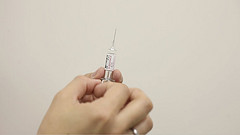- Privacy Policy
- Terms & Conditions
- Contact us
- ©Isabel Healthcare 2020
What travel vaccinations do I need?
 Going on holiday this summer? Holiday season is fast approaching, and chances are you’ve already booked everything from the rent-a-car to the in-flight meal option. But right about now, in some cases 8 weeks before heading out to the sun, is vaccination time. Make sure you haven’t forgotten about your travel vaccinations and get clued up on the jabs you might be needing.
Going on holiday this summer? Holiday season is fast approaching, and chances are you’ve already booked everything from the rent-a-car to the in-flight meal option. But right about now, in some cases 8 weeks before heading out to the sun, is vaccination time. Make sure you haven’t forgotten about your travel vaccinations and get clued up on the jabs you might be needing.
Where are you going?
Obviously the vaccinations required vary greatly depending on the destination. On 9th June, WHO (World Health Organisation) released an updated overview of countries requiring the Yellow Fever vaccination http://www.who.int/ith/2015-ith-county-list.pdf?ua=1 , so just because you’ve been somewhere before and didn’t need any protection, that doesn’t mean you won’t need it this time round, as guidelines and disease presentations can dramatically change very quickly. You only have to look at the Ebola Crisis in West Africa or the developing Middle East Respiratory Syndrome (MERS) virus in China to know that diseases and the risks of them can dramatically change in a short period of time. Currently there are no vaccinations for these diseases available, so where there are vaccinations, equip yourself with the knowledge required to ensure you and your family stay protected. There are various sites that can help with what vaccinations are needed where, but this one is simple to use and very clear, offering information on the diseases mentioned to put minds at ease: http://www.fitfortravel.nhs.uk/destinations/africa/central-african-republic.aspx
Do I have to?
Vaccinations for Yellow Fever are mandatory when travelling to many countries, meaning you will need to present proof of travel vaccination before being allowed over the border. Some border patrols will also ask for certificates for other diseases like cholera, although this isn’t international law. To make sure you’ve got the vaccines needed for you specific country, check visa requirements and ask your physician which ones you definitely have to have.
Having said that, just because the vaccination is not the law, it doesn’t mean you should without a doubt be having it. There are plenty of countries who only recommend the yellow fever vaccination, and nowhere has anti-malaria tablets as mandatory, but you could be at enormous risk if you don’t get your shot or course of tablets. In general, it’s best to get the travel vaccinations recommended to you.
What are the big risks?
Again, it varies from country to country but there are certain diseases it can’t hurt to be aware of, and if they are a risk in the countries you’re travelling to this summer, make sure you get covered.
-
Yellow Fever - Travellers to South America and Africa are at risk of yellow fever, which is carried by mosquitoes. Symptoms include a rash, flu-like fever and muscle aches. In most cases it will solve itself with a lot of rest, but in 15% of cases, it can lead to bigger problems like organ failure, and sometimes even death
-
Malaria - Imagine Yellow Fever, but worse. Malaria also spreads through mosquitoes and mosquito bites, and symptoms are similar to extreme flu, with some cases of vomiting, jaundice and anaemia. There is no vaccination against malaria, but there are several courses of anti-malaria tablets to protect against the disease. If you are heading to a high-risk area for malaria, such as the Middle East, Asia and India, make sure you’re protected
-
Hepatitis A and B - Hepatitis A can show absolutely no symptoms, but is dangerous for your liver. It can be spread easily through contaminated food such as shellfish, and while abroad you could be at greater risk because of no pre-exposure to the disease. Hep B is transmitted through blood, bodily fluids, poor hygiene in hospitals or through sexual contact. Similar to Hep A, it affects the liver and has flu-like symptoms in addition to itching
-
Rabies - Rabies is one to look out for if you are going to be around animals while on holiday. While it is mainly contracted between animals, it can cross over to humans. Although not as common as other diseases, the death rate is extremely high, with most cases proving fatal within a week. Symptoms include muscle spasms and cardiac arrest, and there is currently no cure once you’ve started showing symptoms
-
Typhoid - Another one contracted through contaminated food and drink, symptoms include a nasty fever and rash, acute abdominal pain and constipation. It’s easily contracted, even if you just eat a salad that’s been washed in contaminated water, and although locals may be fine because they’ve built up an immunity, you may not be so lucky.
There are many more diseases you could need protecting against, this is just a few of the biggies. Talk to your GP or physician and discuss with them which vaccinations are needed for your summer holiday, then arrive at your destination safe in the knowledge you’ve done all you can to avoid getting ill on holiday.
If you are worried you may have any of the symptoms above whilst on holiday this summer, run them through the isabel symptom checker, available as an app on apple and android:

Mandy Tomlinson
Mandy has worked for Isabel Healthcare since 2000. Prior to this, she was a Senior Staff Nurse on the Pediatric Infectious disease ward and high dependency unit at one of London's top hospitals, St Mary’s in Paddington which is part of Imperial College Healthcare NHS Trust. Her experience in the healthcare industry for the past 28 years in both the UK and USA means she's a vital resource for our organization. Mandy currently lives and works in Scottsdale, Arizona.
Subscribe Here!
Recent Posts
Virtual Triage: Do more questions lead to better patient outcomes?
One of the common misconceptions related to virtual triage / symptom checker tools is that the more..Webinar: Using Virtual Triage To Transform Patient Access
Outdated contact centers are posing problems for today's health systems. As longer hold times..List Of Categories
- Differential Diagnosis Decision Support
- Differential diagnosis
- Symptom Checker
- Symptoms
- Medical Error
- Patient Disease Information
- Disease
- Diagnostic Decision Support
- Clinical Decision Support
- Isabel 1 Minute Read
- Diagnosis Error
- Diagnosis Skills Cases
- Healthcare Informatics
- Medical Education
- Patient Engagement
- Clinical Reasoning
- Evidence-based Medicine
- Symptom Triage
- Nurse Practitioner Education
- Nursing Decision Support
- Partnership
- Public Health
- COVID-19
- EHR
- Patient Empowerment
- Patient Safety
- rare disease

Start your FREE Trial today
Try the Isabel Pro DDx generator for 30-days - no payment card details required.





